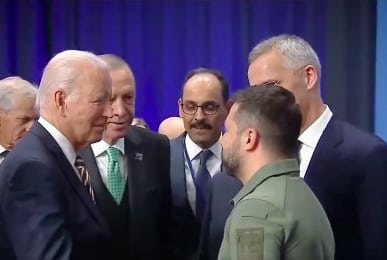President Biden on Wednesday announced that the Group of Seven (G-7) economic powers were launching a joint declaration on Ukraine “to make it clear that our support will last long into the future.”
In remarks he made alongside Ukrainian President Volodymyr Zelensky at the NATO Summit in Vilnius, Lithiuania, Biden said, “We are going to help Ukraine build a strong, capable defense across the land, air and sea. It will be a force of stability in the region and deter against any and all threats.”
“I think it’s a powerful statement,” Biden added. “A powerful statement of our commitment to Ukraine as it defends its freedom today and as it rebuilds…and we are going to be there as long as it takes.”
Zelensky then took to the lectern to say that the “outcome of the NATO Summit in Vilnius is very much needed and a meaningful success for Ukraine.”
He further touted an “important package of security guarantees from NATO” that he called a “significant security victory, for Ukraine, for our country, for our people, for our children.”
Ahead of his arrival at the summit, Zelensky had asserted that his focus would be to seek a clearer pathway for his country to join NATO, along with security guarantees.
While the NATO member nations did not officially invite Ukraine to join the world’s largest military alliance—which Zelensky said he understood was not an option while his country was at war with Russia—Secretary-General Jens Stoltenberg did introduce a three-part package to bring “Ukraine closer to NATO.” It includes the formation of a new NATO-Ukraine Council, the reaffirmation that Ukraine would eventually become a member of the alliance, and the removal of certain membership requirements.
Answering questions from reporters after their speeches, Biden quipped jokingly that it should take “an hour and twenty minutes” for Ukraine to join NATO after its war with Russia ends.
“We all need certainty – in particular, institutional certainty,” Zelensky tweeted Wednesday. “And it is very good that the NATO-Ukraine Council can really give us the necessary institutional certainty. It is important for us that the NATO-Ukraine Council will be an instrument of integration, not just partnership. Thank you for that!”


